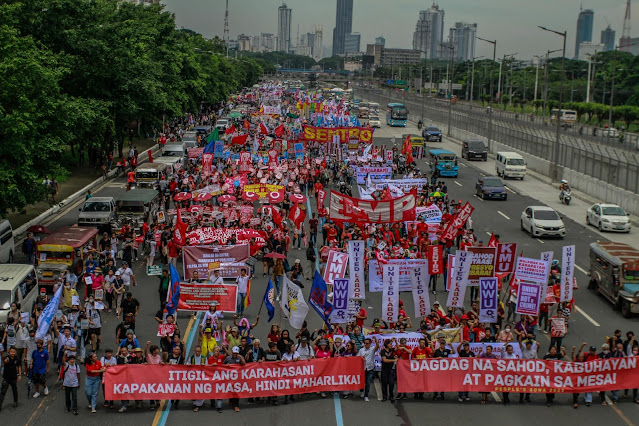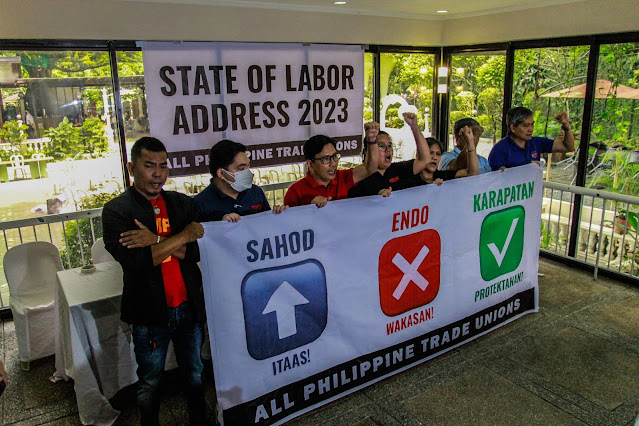Ahead of President Ferdinand “Bongbong” Marcos Jr.’s second State of the Nation Address (SONA), All Philippine Trade Unions (APTU) held the 2023 State of Labor Address (SOLA) on 19 July 2023 to shed light on issues faced by working Filipinos and their families and amplify calls for: (i) better wages; (ii) ending contractualization; and (iii) the full and free exercise of workers’ freedom of association and right to organize.
APTU, comprised of the Nagkaisa! Labor Coalition, Kilusang Mayo Uno (KMU), the Trade Union Congress of the Philippines (TUCP), Bukluran ng Manggagawang Pilipino (BMP) and trade unions affiliated with the Council of Global Unions, was established in January 2023 when these workers’ organizations came together to submit their report to the International Labour Organization High Level Tripartite Mission (ILO HLTM), on the state of freedom of association in the Philippines. Since then, APTU has been working together to forge a common position on various issues that concern the labor sector, such as the issues of Sahod, Trabaho, at Karapatan, expressed in its mobilization during the May 1, 2023 workers’ rally.
The ₱40 daily minimum wage increase in NCR is too little, too late. It is not even half of the purchasing power lost to inflation, a loss valued at ₱89, based on the June 2023 consumer price index (CPI). It cannot even add a kilo of well-milled rice to a working family’s table for each working day. The ₱610 new NCR minimum wage is nowhere near the daily family living wage – a right enshrined in our Constitution and the Wage Rationalization Act, estimated by the IBON Foundation at ₱1,163. The struggle in Congress continues, in legislating towards true wage recovery and living wages. Through recent economic crises, workers sacrificed so much, and continue to sacrifice. In economic recovery, Government and employers must share in these sacrifices, as we work towards better policies to realize more decent work and a more equitable Philippine society.
APTU supports all proposed legislated wage increase measures currently pending in the House of Representatives and the Senate. These include the ₱150 across-the-board wage recovery increase filed by House Deputy Speaker Mendoza (TUCP) and Senate President Zubiri, as well as the ₱750 across-the-board wage hike towards family living wages, filed by the Makabayan Bloc. Congress should immediately hear and pass these bills to save working families from being a class of the permanently working poor trapped in precarious work and poverty wages. The regional wage boards outside of Metro Manila should immediately conduct consultations and hearings and issue substantial wage increase orders with urgency and dispatch.
Contractualization continues to be a bane for a majority of workers in precarious work arrangements. In the absence of stronger security of tenure legislation and decisive policy action by the Executive, precariousness is further entrenched by the continued implementation of the Department of Labor and Employment (DOLE) Department Order 174. More often, workers are forced to accept jobs that pay below minimum standards. Although government statistics claim a reduction of unemployment, in practice, current conditions likely tend towards workers taking on any job, even low-paying, poor-quality jobs, just to make ends meet.
APTU called on Government to immediately end the pandemic of contractualization by passing the Security of Tenure (SOT) Bill for both private and public sector workers, and the Public Service Labor Relations Act for the public sector. The Government must focus all its attention, resources, and energy on a comprehensive, yet sustainable labor and employment program.
Today, the Philippine labor rights situation is under the global spotlight. In January 2023, we welcomed the ILO High-Level Tripartite Mission to the country, which recommended actions to address its findings on persistent anti-union violence, political profiling, impunity, and lack of substantial progress in compliance with labor rights and standards. In June 2023, during the International Labour Conference (ILC) in Geneva, Switzerland, the Philippines was included in the shortlist of 22 countries in persistent violation of ILO Conventions on fundamental labor rights. For the seventh straight year, the Philippines had been ranked by the International Trade Union Confederation (ITUC) as among the top ten worst countries for workers. By working together as social partners with the Government and employers, we can correct our troubling track record in workers’ rights and labor relations to reduce risk with an economic and employment impact, such as on trade benefits in relation to the renewal of EU and US Generalized Sytem of Preferences (+) and potential free trade agreements and foreign direct investment.
APTU called on the Government, especially DOLE, to comply with all ILO HLTM recommendations, beginning by amending or replacing Executive Order No. 23 to establish the Presidential Commission on Freedom of Association, which should include tripartite representation for both workers and employers. With the September 1, 2023 deadline set by the ILO for submission of the Philippine’s action plan for compliance fast approaching, DOLE should immediately address the finalization and adoption of the Roadmap on Freedom of Association in a tripartite manner.
APTU reminded the Government that all trade opportunities, such as the US GSP, EU GSP+, and free trade agreements, are tied to the Philippines’ compliance with fundamental labor standards and the full and free exercise of workers’ rights.
For decades, women workers, in particular, have also been on the losing end of concerns with security in workplaces. It is appalling how the wage gap based on gender continues to persist, and women workers have been subject to precarious and informal work, most of them contractual. Violence in the workplace and in the larger world of work continue to hound women workers and put a heavy burden on their shoulders that can only be alleviated by decisive policy interventions.
APTU asserts the importance of women workers’ participation in campaigning for reforms in labor concerns, such as in increasing the minimum wage, ending contractualization, and reinforcing observance of trade union and labor rights. APTU called on women workers to campaign for our Government’s ratification of ILO Convention 190 on the Elimination of Violence and Harassment in the World of Work.
APTU believes that a dialogue between Philippine labor and the President is long due, which should place workers’ rights and their welfare front and center in the Administration’s labor, employment, and economic policies.
APTU will continue to build the strongest and broadest unity among Filipino workers and their organizations, forging ahead in the struggle for living wages, decent work, and the full observance of fundamental labor rights.
All Philippine Trade Unions
Press Statement
19 July 2023

